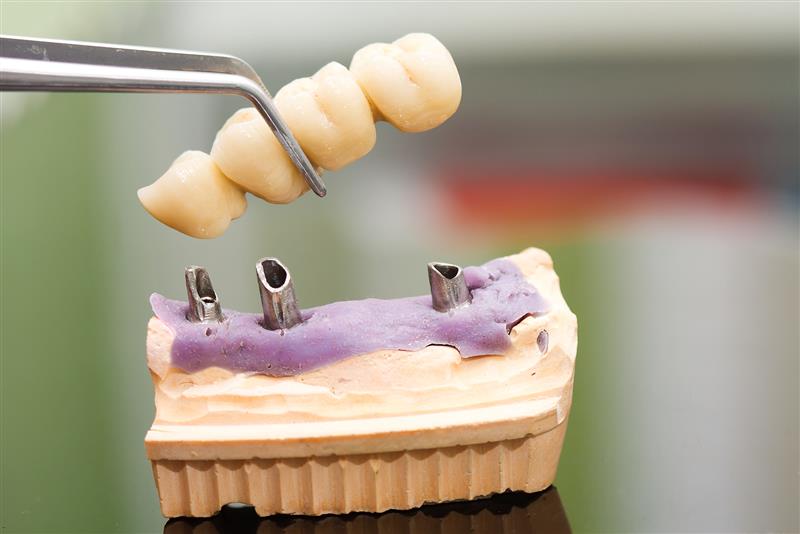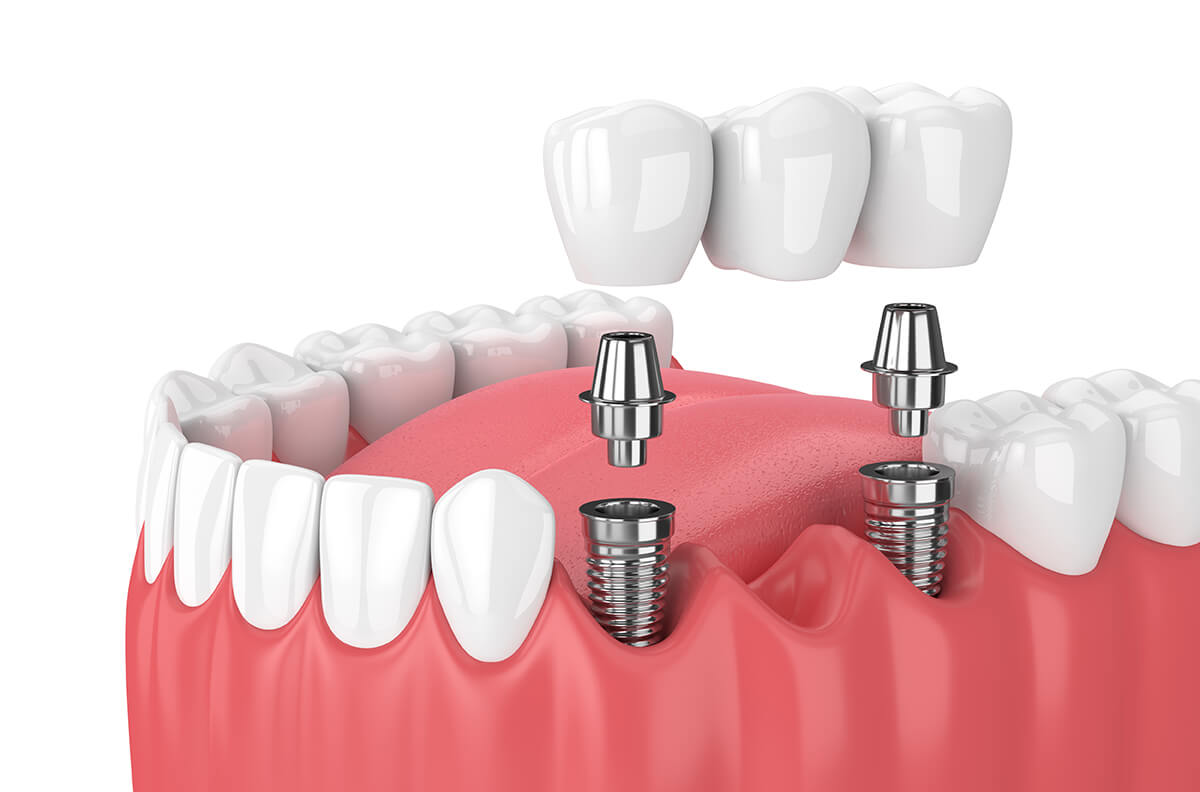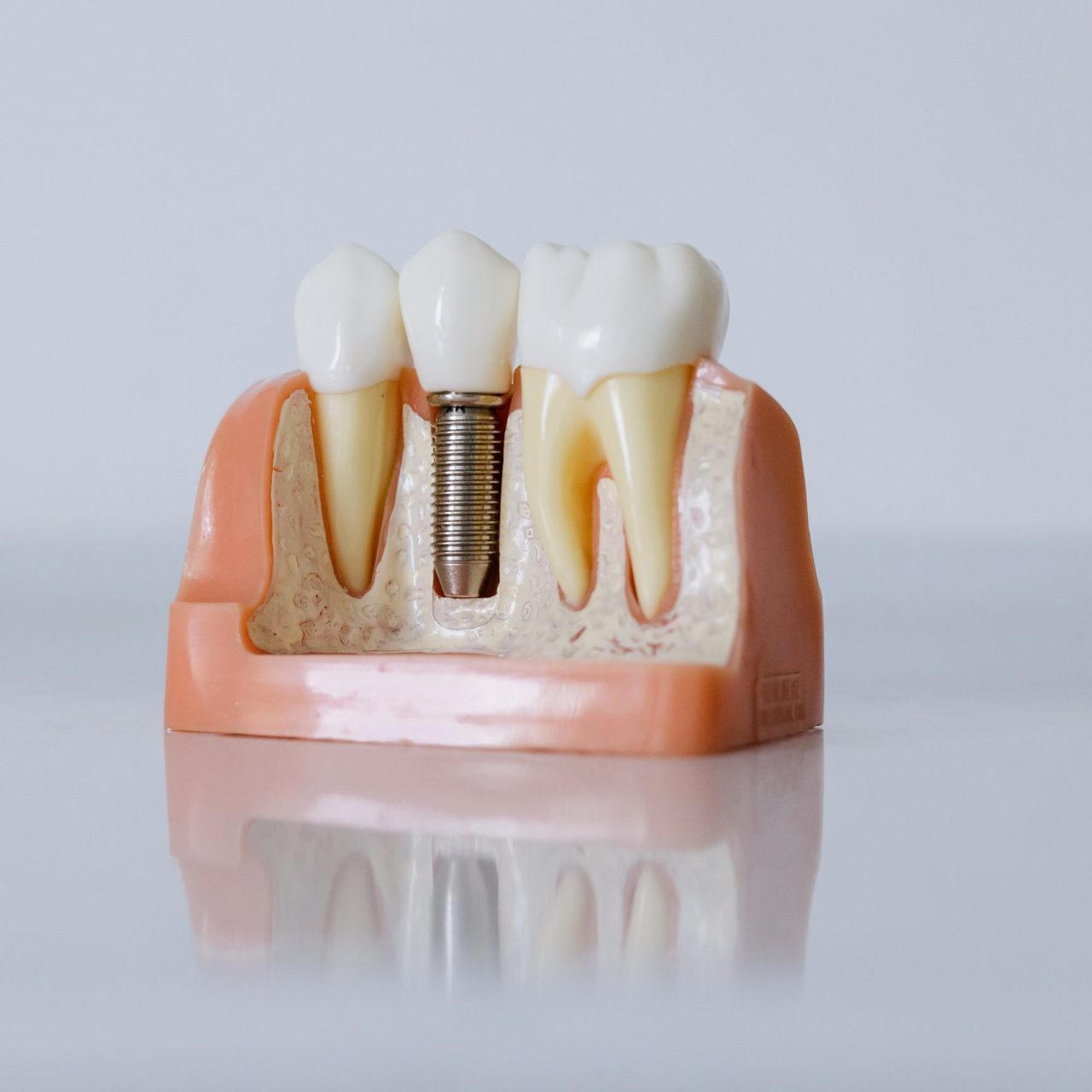Bridges and Implants in New Canaan, CT

Missing teeth can significantly impact both the function and aesthetics of your smile. Whether you’ve lost a tooth due to decay, injury, or other dental health issues, you have a variety of options for restoring your smile and ensuring that your bite is properly aligned. Two of the most effective and long-lasting solutions for replacing missing teeth are dental bridges and implants. These restorative treatments help rebuild your smile, improve your oral health, and restore your ability to chew and speak comfortably.
Dental Bridges
A dental bridge is a prosthetic device used to replace one or more missing teeth by “bridging” the gap between two healthy teeth. The bridge is made up of one or more artificial teeth that are anchored to the adjacent natural teeth (referred to as abutment teeth) or dental implants. Bridges are typically made of materials like porcelain, gold, or a combination of materials, with porcelain being the most popular due to its natural appearance and durability.
Types of Dental Bridges
- Traditional bridges: These are the most common type of bridge consisting of one or more artificial teeth supported by dental crowns placed over the adjacent natural teeth. Traditional bridges are an excellent choice if you have healthy teeth on either side of the gap.
- Cantilever bridges: Cantilever bridges are similar to traditional bridges, but they are supported only by a single natural tooth on one side of the gap. This type of bridge is ideal when there is only one tooth available for support.
- Maryland bridges: Maryland bridges use a metal or porcelain framework that is bonded to the back of the adjacent teeth. This type of bridge is typically used for replacing front teeth and is less invasive than traditional bridges.
- Implant-supported bridges: These bridges are supported by dental implants rather than natural teeth. Implant-supported bridges are a more permanent solution for patients who have multiple missing teeth in a row. The implants act as anchors to hold the bridge in place.
Benefits of Dental Bridges
- Restores function and aesthetics: Dental bridges not only fill the gaps left by missing teeth but also help restore your ability to chew and speak properly. They also improve the appearance of your smile by replacing teeth that are missing or damaged.
- Prevents shifting of teeth: When you have missing teeth, the surrounding teeth can shift into the gap, leading to alignment issues. A bridge helps prevent this movement, maintaining the integrity of your bite.
- Faster treatment: Getting a dental bridge is generally quicker than getting a dental implant. Most bridges can be placed in just two or three visits, resulting in a functional and aesthetic restoration.
- Cost-effective: Compared to dental implants, bridges are generally more affordable. They offer a solution that restores your smile and bite without the higher upfront cost of implants.

The Treatment Process for Bridges in New Canaan, CT
The process of getting a dental bridge typically involves several stages:
Consultation and Examination
During your first visit to New Canaan Dentistry, we will conduct a thorough examination to assess the health of your teeth and gums. We may take X-rays or 3D imaging to determine the best treatment approach.
Tooth Preparation
If you are getting a traditional or cantilever bridge, the adjacent teeth will need to be prepared by removing some enamel to make room for the crowns. For Maryland bridges, the adjacent teeth are only slightly altered.
Impressions
Once the teeth are prepared, impressions are taken to create a custom bridge that fits your mouth precisely. These impressions are sent to a dental laboratory where the bridge will be fabricated.
Temporary Bridge
While your permanent bridge is being created, we will place a temporary bridge to protect the exposed teeth and gums.
Fitting and Adjustment
After your permanent bridge is ready, we will place it in your mouth to ensure it fits properly. We will make any necessary adjustments before cementing it in place.
What Are Dental Implants?
A dental implant is a small titanium post that is surgically placed into the jawbone to replace the root of a missing tooth. Once the implant has fully integrated with the bone (a process called osseointegration), a crown, bridge, or denture can be attached to the implant to restore the appearance and function of the lost tooth.
Implants are an excellent permanent solution for missing teeth and are often considered the gold standard in tooth replacement due to their stability, durability, and natural look.
Types of Dental Implants
- Single tooth implants: Single implants are used to replace one missing tooth. A titanium post is placed in the jawbone, and a custom crown is placed on top of it.
- Implant-supported bridges: For patients missing multiple teeth in a row, an implant-supported bridge is often used. Implants are placed at either end of the gap, and a bridge is attached to the implants.
- All-on-4 implants: This is a full-arch replacement solution for patients who have lost most or all their teeth in one or both arches. Four implants are placed in strategic positions to support a full set of prosthetic teeth. Contact us to learn more.
Benefits of Dental Implants
- Long-term durability: Dental implants are designed to last for many years, often decades, with proper care. They are made of titanium, which is highly resistant to corrosion and integrates well with the bone.
- Natural look and feel: Implants look, feel, and function like natural teeth. Since they are anchored directly in the jawbone, they provide a secure foundation for restorations, eliminating the risk of slipping or discomfort associated with dentures.
- Preserve jawbone health: One of the unique benefits of dental implants is their ability to prevent bone loss in the jaw. When a tooth is lost, the jawbone can begin to deteriorate. Implants stimulate the bone, helping to preserve its density and strength.
- No need for altering adjacent teeth: Unlike dental bridges that require the adjacent teeth to be prepared (drilled) for crowns, dental implants do not affect the surrounding teeth. This makes implants a more conservative option in terms of preserving your natural tooth structure.
- Improved function: Dental implants restore full chewing ability, allowing you to enjoy your favorite foods without limitations. Implants also eliminate the need for messy adhesives or removable appliances, making them a more stable and comfortable option.
The Treatment Process for Implants in New Canaan, CT,
The process of getting a dental implant involves several steps, typically spanning a few months:
Consultation and Examination
A thorough consultation is necessary to determine if you are a suitable candidate for dental implants. We will assess your oral health and take imaging to ensure you have enough healthy jawbone to support the implant.
Implant Placement
The first step in the procedure is placing the titanium implant into the jawbone. This is done under local anesthesia or sedation to ensure your comfort. The implant will need several months to fuse with the bone.
Healing and Osseointegration
After the implant is placed, it will require time to be integrated with the bone. This process, known as osseointegration, typically takes several months.
Restoration
Once the implant has been fully integrated, a custom crown, bridge, or denture is placed on top of the implant. This completes the restoration process, and your implant will function like a natural tooth.
Which Option Is Right for You?
Both dental bridges and implants offer excellent solutions for replacing missing teeth, but they are suited for different situations. A dental bridge may be suitable for those who want a quicker, more affordable solution and have healthy adjacent teeth. On the other hand, dental implants are a more permanent and stable option, particularly for those with significant bone loss or those who want to avoid altering healthy teeth.
At New Canaan Dentistry, we will work with you to determine the best option based on your needs, preferences, and budget. During your consultation, we will discuss the pros and cons of each option and help you make an informed decision about which treatment is right for you.

Conclusion
Whether you choose a dental bridge or implant, you can be assured you have a durable, effective solution for restoring your smile and improving your oral health. With advances in modern dentistry, these treatments are designed to blend seamlessly with your natural teeth, ensuring a comfortable and attractive result. If you're ready to explore your options for replacing missing teeth, we invite you to schedule a consultation at New Canaan Dentistry in New Canaan, CT, to discuss how bridges and implants can restore both the function and beauty of your smile.
Schedule an appointment with us at New Canaan Dentistry, located at 162 East Avenue, New Canaan, CT 06840. For bookings and consultations, call (203) 972-0588. Please visit our official website to learn more about our various services.
Durable Zirconia Dental Crowns & Onlays
Teeth Whitening / Teeth Brightening
Cosmetic Dentistry
Invisalign / Clear Aligners
Durable zirconia dental crowns
Preventive care / Diagnostics
Emergency Dentistry
Root Canals
Mercury-Free Tooth-Colored Fillings
Treatment for Bruxism/Tooth Grinding
Restorative Dentistry
Dental Implants
Periodontal screenings and treatment
Oral hygiene (preventative care)
Teeth Whitening
General Dentistry
Invisalign
X-Rays
Porcelain and Gold Onlays, Crowns, Bridges
Intraoral Camera
Biomimetic Dentistry
Lava™ All-Ceramic System
Bondings
Porcelain Dental Crowns & Bridges
Porcelain Dental Veneers
Office Hours
MON10:00 am - 6:00 pm
TUEClosed
WED10:00 am - 6:00 pm
THU9:00 am - 4:00 pm
FRI10:00 am - 6:00 pm
SATClosed
SUNClosed
